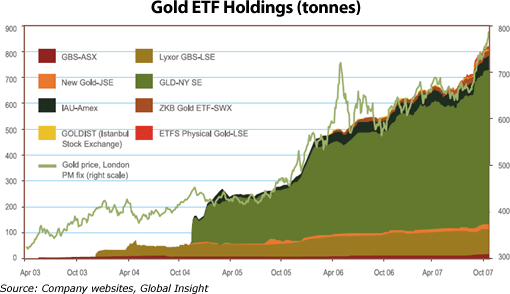Wheee – here we go!
The Nikkei ran up to 10,986 this morning and the US futures are flying. Why? Who cares – it’s a RALLY and we all love rallies because, if the stock market is rallying then everything must be great. Things are, in fact SO GREAT that the market doesn’t even care that 35 people were blown to bits on the Moscow subways this morning. Just in case you are keeping score: If people are killed in London – Big crash. If people are killed on a Spanish train – Big crash. If there is even a scare in New York – Big crash. 2 separate attacks killing 35 people and injuring 65 more in Russia – Big rally. That’s the New World Order, I guess…
Perhaps we are just getting used to terror attacks but why then, do oil and gold spike and why is there a $30 per barrel "terror premium" in the price of oil if our reaction to an actual terrorist attack in one of the World’s largest cities is to jam the US futures up 0.5%? Perhaps part of the problem is that oil, like gold doesn’t actually exist. That’s right – we already know that the NYMEX trades over 4Bn barrels worth of contracts per month and delivers less than 30M – so the physical barrels of oil to the traded number of contracts is a ratio of 1:133 or 0.67%, almost a rounding error to zero. Well, it turns out that gold is just as bad as last week’s CTFC Public Hearings on Precious Metals reveal gold trading to be nothing more than a huge Ponzi scheme in which there are over 100 times more contracts for gold than there is physical gold. Here’s a great video of the testimony, and a part 2.
 1,625 tons of gold are mined on an annual basis but the LBMA is trading 20M ounces (625 tons) PER DAY or 150,000 tons a year, which is the sum total of ALL the gold that has EVER been produced in history and roughly 100 times the actual physical float of gold and most of that float is being churned over and over by the various ETFs (see chart) who have been doing 1/3 of the world’s buying for the past 5 years.
1,625 tons of gold are mined on an annual basis but the LBMA is trading 20M ounces (625 tons) PER DAY or 150,000 tons a year, which is the sum total of ALL the gold that has EVER been produced in history and roughly 100 times the actual physical float of gold and most of that float is being churned over and over by the various ETFs (see chart) who have been doing 1/3 of the world’s buying for the past 5 years.
Does the lack of actual gold make the bullion you hold more valuable? That’s an interesting question. Mortgage backed securities didn’t get more valuable as mortgages diminished in value but I suppose this gold scam can keep going as long as no one actually asks for their physical gold. I would advise having actual gold if you are using it as a hedge and not trusting your fate to contracts that may never be able to make good on the physical delivery they promise. Overall though, I don’t think much of gold as an investment. Gold historically had value because it was scarce, difficult to produce and easy to verify – I could make the same argument for old baseball cards or comic books and my daughter would trade them all for a "Legendary" Pokemon she’s been looking for.
 Where, ultimately does gold find value? It reminds me of something written a long time ago in Marginal Revolution about fiat currencies and Gilligan’s Island: "In early episodes, we see Mr. Howell hiring various services from other castaways. We eventually learn he’s been writing checks on a mainland (and therefore inaccessible) bank. This works while the group consider their condition temporary, but the checks are quickly devalued and eliminated when the castaways begin to prepare for the possibility of an indefinite stay on the island. In Episode 9, "The Big Gold Strike," Gilligan and Mr. Howell find a gold mine on the island, which Howell convinces Gilligan to keep secret from the others. By the time everyone learns about the mine, Howell has already taken the lion’s share of the most easily accessible gold. He’d like to hoard it for himself, but the other castaways begin charging him for their goods and services."
Where, ultimately does gold find value? It reminds me of something written a long time ago in Marginal Revolution about fiat currencies and Gilligan’s Island: "In early episodes, we see Mr. Howell hiring various services from other castaways. We eventually learn he’s been writing checks on a mainland (and therefore inaccessible) bank. This works while the group consider their condition temporary, but the checks are quickly devalued and eliminated when the castaways begin to prepare for the possibility of an indefinite stay on the island. In Episode 9, "The Big Gold Strike," Gilligan and Mr. Howell find a gold mine on the island, which Howell convinces Gilligan to keep secret from the others. By the time everyone learns about the mine, Howell has already taken the lion’s share of the most easily accessible gold. He’d like to hoard it for himself, but the other castaways begin charging him for their goods and services."
You may have your 8 pounds of gold ($150K) when the world falls apart (or whatever the fantasy end game is for gold bugs) and you may lug it over to the store to buy some clean water or use it to barter for medicine when you get sick but who’s going to set the price for you then? How much will be a "fair" exchange when the exchanges fail? That’s the real difference between gold and oil – gold can float to extremely unrealistic levels and then drop like a rock because – when push comes to shove – no one NEEDS it. Oil, on the other hand, must ultimately be consumed every day and raising the price can diminish demand and vice versa. Raising the price of gold, however, stampedes more and more people into ETFs that buy more and more gold (or at least contracts for gold as we have now learned) which raises the prices and brings more and more people into the ETFs, who order more gold, etc… What can go wrong with that?
A Shanghai court found an Australian RTP mining executive and 3 Chinese national executives guilty of accepting bribes and stealing secrets and sentenced him to 10 years in prison. The Shanghai Composite jumped 2% in today’s trading and the Hang Seng was up a point but the Nikkei was down slightly despite news that Japanese Retail Sales made their biggest gain in 13 years. China’s Geely is buying Volvo from Ford for $1.8Bn after 18 months of talks. India’s Tata Motors bought Aston Martin, Jaguar and Land Rover from Ford in 2007 for $2.4Bn and they have just paid off the last of that debt with a 13.8% rise in their stock price since the acquisition.
Europe isn’t as excited as our futures are this morning (9am) – perhaps because they, unlike Americans, realize Russia is a real place that matters on the World stage. Commodities, especially copper, which is up to $3.50 again, has been leading EU markets this morning. Oil spiked to $81 and gold to $1,115 and it’s all nonsense but this is going to be a very thinly traded week so nonsense will be the most sensible bet to make.
 Overall Economic Confidence is at a 2-year high as a weak Euro boosts exports so bad news is, of course, good news. Greece will be selling $5Bn of 7-year bonds to help refinance their debt but the biggest news being ignored on a Manic Monday is a $209Bn shortfall in funds needed to refinance commercial real-estate debt required by EU Banks over the next 24 months.
Overall Economic Confidence is at a 2-year high as a weak Euro boosts exports so bad news is, of course, good news. Greece will be selling $5Bn of 7-year bonds to help refinance their debt but the biggest news being ignored on a Manic Monday is a $209Bn shortfall in funds needed to refinance commercial real-estate debt required by EU Banks over the next 24 months.
About 480 billion euros of property loans will mature by the end of 2011, according to research by the London-based broker. Banks won’t be able to refinance all of the debt, particularly when loans exceed the value of the properties backing them. More than half of the shortfall will occur in the U.K. and Spain, DTZ said. European lenders are grappling with the legacy of 1.8 trillion Euros of loans given to buyers of stores, offices and warehouses in the five-year real estate boom that ended in mid- 2007. Many were granted near the market’s peak at more than 80 percent of building values. Prices then sunk by about 26 percent across continental Europe and 44 percent in the U.K, leaving many borrowers owing more than the value of the buildings. The shortfall “is the biggest short-term challenge to the European property markets,” Nigel Almond, the study’s co-author, said in the report. “As many loans reach their maturity in the next few years, we expect defaults to become more likely.”
We have a busy data week with Personal Income and Outlays and the Dallas Fed today; Retail Sales, Case-Shiller, Consumer Confidence, Investor Confidence and more Consumer Confidence tomorrow; Mortgage Applications, ADP Jobs, Chicago PMI, Factory Orders and Oil Inventories on Wednesday; Auto Sales, Monster Employment, Challenger Jobs, Unemployment, ISM Manufacturing, Construction Spending, the Fed Balance Sheet and the Money Supply on Thursday and Friday, even though we are closed, we’ll get Non-Farm Payrolls at 8:30 so let’s hope those are good!
We had a fabulous week of trading last week (as detailed in the Wrap-Up) so we’re not looking to spoil it by deploying our cash ahead of the holiday weekend but that won’t stop us from taking a few opportunities when they present themselves. Still, overall we’re having fun watching the shenanigans and we’ll see if it’s enough to get to that magical 11,000 mark. With the low volume we expect this week it will be very sad for the bulls if they can’t pull it off.


